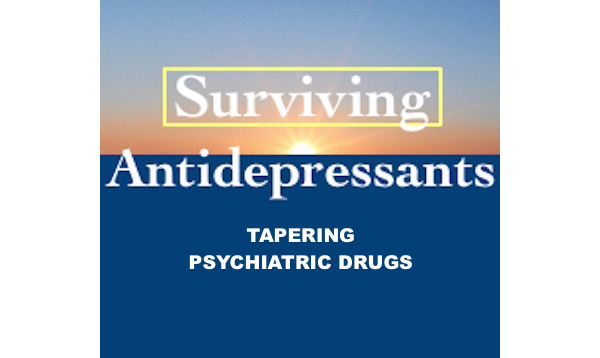A new article published in the journal Therapeutic Advances in Psychopharmacology reveals how the internet, and the website SurvivingAntidepressants.org in particular, has become the leading source of information for withdrawing from psychiatric drugs. The website has created a virtual space for peer-support and tapering advice where thousands of individuals have found help with psychiatric drug withdrawal symptoms when their healthcare providers could not meet their needs.
Adele Framer, the author, is the founder of the website and virtual support space SurvivingAntidepressants.org. She is also known by her online handle Altostrata. Framer was previously interviewed by Mad in America about her lived experience with protracted withdrawal symptoms (PWS) after discontinuing psychotropic medication.
“At age 50,” Framer writes, “in excellent physical health, I was prescribed 10mg of paroxetine for work stress, following which I developed sexual dysfunction, emotional anesthesia, and after a couple of years, demotivation. After a disastrous psychiatrist-directed switch to escitalopram, I sought tapering advice… Receiving none, I went off paroxetine over a few weeks in 2004. Off paroxetine, I initially experienced hypomania, sweating, and electrical feeling ‘brain zaps’, the last continuing for several months. After several weeks, my acute withdrawal symptom pattern changed to other odd symptoms, among them disorientation, depersonalization, insomnia, light and heat intolerance, indigestion, palpitations, and unease, punctuated by spontaneous weeping spells, attacks of sheer terror, or sudden plunges into unprecedented contentless black holes of pure dread…It did not feel like ‘relapse.’”
 Framer is not alone. It is estimated that half of the individuals who discontinue psychiatric medication experience withdrawal symptoms. However, these symptoms are often misdiagnosed as a functional disorder or “relapse” back into mental illness. It is believed that withdrawal symptoms result from drug-induced neuro-physiological adaptions and can be curbed with a slow and gradual tapering schedule instead of a sudden termination of the drug.
Framer is not alone. It is estimated that half of the individuals who discontinue psychiatric medication experience withdrawal symptoms. However, these symptoms are often misdiagnosed as a functional disorder or “relapse” back into mental illness. It is believed that withdrawal symptoms result from drug-induced neuro-physiological adaptions and can be curbed with a slow and gradual tapering schedule instead of a sudden termination of the drug.
However, information on tapering and slow cessation of psychotropic drugs is hard to come by, which is why Framer started SurvivingAntidepressants.org years ago.
“People who have conditions that are not well understood by medicine search the Internet for answers,” she explains. “We would very much prefer to refer to knowledgeable medical providers, but website members have been unable to find them.”
Framer reports what she has learned from the online community over the years.
- People from all walks of life request assistance tapering off all kinds of psychiatric drugs. However, SurvivingAntidepressants.org came about because of those taking psychiatric drugs (one in six US adults), 95% were/are taking antidepressants.
- Differentiating “relapse” from withdrawal symptoms requires both listening and patience. Emotional symptoms of withdrawal can be confusing. But Framer points out that the emotional symptoms of acute withdrawal are sudden, unlike a relapse which is gradual. Patients often describe their withdrawal feelings as “new or exceptionally severe.” For example: “I’ve never felt this before.” Causing electrical sensations in the brain, often described as “zaps,” among other physiological conditions, including dizziness, pain, nausea, and insomnia.
- The taper can and ought to be adjusted to the individual, as tolerance levels vary widely. The taper also should take into account the trickier drugs to taper and deprescribe, in particular, antipsychotics and paroxetine.
- Often what makes tapering and deprescribing drugs challenging are adverse drug reactions and polypharmacy. These factors make it difficult to determine what drug is causing each symptom. Indeed, there are countless narratives on SurvivingAntidepressants.org recalling the difficulties of prescription cascades, adverse drug reactions, and drug-drug interactions.
“Many who come to the site for help with tapering or withdrawal syndrome seem to also be tolerating adverse drug reactions, such as insomnia, sexual dysfunction, activation, and allergic reactions,” she writes. “Although they were miserable on the drugs, these people were advised they needed to continue taking them for therapeutic benefit, and so they did, for years.”
- Withdrawal symptoms indicate neurological instability, necessitating more caution when practitioners consider new medications or ameliorative dosages.
- Never skip doses to taper.
“Any patient is at risk for psychotropic withdrawal symptoms, and the severity of injury from unrecognized adverse drug effects and withdrawal symptoms can be major. Patients need prescribers to revise their assumptions and practices for the sake of our nervous symptoms,” Framer argues.
Framer’s article, “What I have learnt from helping thousands of people taper off antidepressants and other psychotropic medications,” and her website open up doors for clinicians to understand how to understand psychotropic drug withdrawal better. Her work also gives a unique and powerful scientific authority to the lived experience of those who had visited SurvivingAntidepressants.org seeking advice and community wisdom when more formal channels did not have the answers to help.
****
Framer, A. (2021). What I have learned from helping thousands of people taper off antidepressants and other psychotropic medications. Therapeutic Advances in Psychopharmacology, 11, 2045125321991274. (Link)














Greetings and salutations to Altostrata! I’ve been a fan of S.A. and its work for some time now.
Report comment
Thank you for this fine article, Samantha.
I would like to clarify this point: “However, these symptoms are often misdiagnosed as a functional disorder or “relapse” back into mental illness.”
I do not know how often antidepressant withdrawal symptoms are misdiagnosed as a functional disorder (Functional Neurological Disorder or FND). I cannot recall any incidences of this on my Web site, which is based in the US, with a majority US membership.
In my opinion, misdiagnosis of withdrawal syndrome as “relapse” by GPs or psychiatrists is far, far more frequent — near total. Most likely, this misdiagnosis is so pervasive, it precludes most people suffering from withdrawal syndrome from advancing to see a neurologist.
It takes a stubborn patient to get to the neurologist specialty level. Of those on my Web site (including myself) who have taken their psychiatric drug withdrawal syndromes to neurologists, the most they get is a shrug rather than a diagnosis, and maybe a referral back to psychiatry.
A diagnosis of FND for people with psychiatric drug-induced movement disorders may be misguided but it may be a portal to the best treatment these people can get, since psychiatry is notably blasé about those movement disorders. The danger in not taking drug withdrawal syndromes into account in a FND diagnosis is that psychiatric drugs are one of the treatment options, and when applied to a nervous system already sensitized by drugs, may cause further damage.
There is no doubt that in this overdrugged world, training in recognizing iatrogenic syndromes needs to be introduced and even emphasized for neurologists.
To sum up, from what I’ve seen, a misdiagnosis of “relapse” for withdrawal syndrome is a clinical error occurring far more frequently than a diagnosis of FND. FND is a possible but not major withdrawal syndrome misdiagnosis.
Report comment